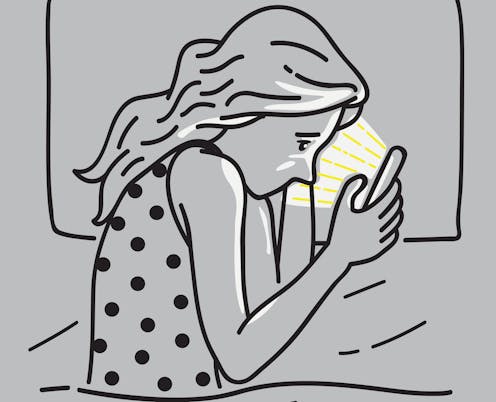Teens are sleeping less -- but there's a surprisingly easy fix
The amount of time teens have spent working and participating in extracurricular activities has held steady in recent years. There has, however, been one big change in their lives: smartphones.

Something is stealing teens’ sleep.
In a newly released analysis of two large national surveys, my co-authors and I found that the number of U.S. teens who reported sleeping less than seven hours a night jumped 22 percent between 2012 and 2015. Sleep experts agree that teens need at least nine hours of sleep a night. But by 2015, 43 percent of teens reported sleeping less than seven hours a night on most nights – meaning almost half of U.S. teens are significantly sleep-deprived.
What could have raised sleep deprivation among teens to such unprecedented levels? Some factors are easy to rule out. For example, we found that the amount of time teens spent working, doing homework and participating in extracurricular activities held steady during those years.
But there was one large change in teens’ lives between 2012 and 2015: More owned smartphones.
It starts as an alarm clock…
Today’s teens – whom I call “iGen” – are the first generation to spend their entire adolescence with smartphones.
In our analyses, we found that teens who spent more time online and on social media were more likely to sleep less. Time spent watching television had a much weaker link to fewer hours of sleep, and teens who spent more time with their friends in person or on sports or exercise actually slept more.
Time spent online, however, was the one teen activity that both increased during the 2010s and was linked to shorter sleep, making it the most likely cause of teen sleep deprivation. Seventeen- and 18-year-olds – who spend more time online than younger teens – were also the most sleep-deprived: The majority, 51 percent, slept less than seven hours on most nights by 2015.
The link between time spent online and less sleep was considerable. Spending five or more hours a day online (vs. one hour) upped the risk of sleeping too little more than 50 percent. Spending three hours a day (vs. one hour) upped the risk nearly 20 percent.
Smartphones – which the majority of Americans owned by the end of 2012 – allow mobile and instant internet access. It’s difficult to prove what causes what in an analysis like this, but it seems much more likely that teens’ increased smartphone use between 2012 and 2015 led to less sleep than less sleep leading to more smartphone use.
Why might smartphones cause teens to sleep less? Unlike other electronic devices such as TVs and desktop computers, smartphones (and tablets) are easily carried into the bedroom and held by hand in bed.
Most of the students I interviewed for my book “iGen” told me they kept their phones within reach as they slept, in part, because they all used it as their alarm clock.
Many also told me that their smartphones were the last thing they looked at before they went to sleep at night. That’s a problem, because answering texts and scrolling through social media is mentally and emotionally stimulating, which leads to disturbed sleep. Others told me that they also regularly reached for their phones, often just out of habit, when they woke up in the middle of the night.
There’s a physiological response as well: The blue light emitted by smartphones and tablets simulates daylight, inhibiting the brain’s production of melatonin, the hormone that helps us fall asleep and stay asleep.
And that’s if teens try to go to sleep at all.
A 2014 study found that 80 percent of teens admitted to using their phones when they were supposed to be sleeping – a practice some call “vamping.” Some said they stayed up most of the night when their parents thought they were asleep.
Some simple limits
Sleep deprivation can have serious consequences for teens.
Those who don’t sleep enough perform more poorly in school and are at greater risk of developing obesity. Sleep deprivation is also linked to mental health issues including depression and anxiety among both teens and adults.
When conducting research for my book, I found that iGen teens are more likely to be depressed and anxious than previous generations. If smartphones cause teens to sleep less, and less sleep leads to depression, sleep deprivation might explain why teen depression increased sharply after 2012 – exactly when smartphones became common, and exactly when sleep deprivation began to increase among teens.
What can be done? Later start times at high schools have significant positive impacts on teen sleep, but school start times aren’t something parents and teens can control.
In contrast, limiting smartphone use before bed is a strategy that can be immediately implemented (ideally for the whole family, adults included). A “no phones in the bedroom after bedtime” rule can work. If your family uses phones as alarm clocks, buy inexpensive alarm clocks. Put an app on phones that shuts them down during certain hours, or leave phones and tablets in another room overnight. Suggest reading a book, taking a bath, or writing in a journal in the hour before bed.
Your teens will probably get some more sleep – and they might find themselves healthier and happier as well.
Jean Twenge has received funding from the Russell Sage Foundation and the National Institutes of Health.
Read These Next
Valentine’s Day cards too sugary sweet for you? Return to the 19th-century custom of the spicy ‘vine
Victorians found a way to anonymously tell people they didn’t like exactly how they felt.
Winter Olympians often compete in freezing temperatures – physiology and advances in materials scien
While physical exertion helps athletes stay warm, sweating can lead to dehydration.
Whether it’s yoga, rock climbing or Dungeons & Dragons, taking leisure to a high level can be good f
When a hobby becomes something larger, with a focus on improving skills and developing deep knowledge,…






